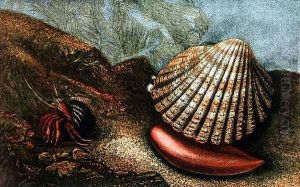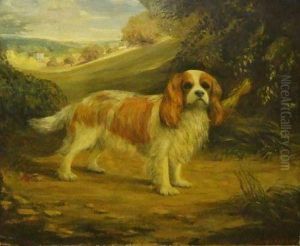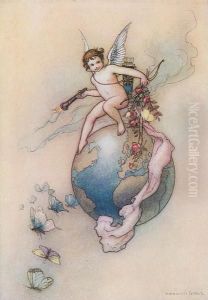Charles Kingsley Paintings
Charles Kingsley was not primarily known as a visual artist, but rather as a prolific writer, a social reformer, a historian, and an Anglican priest. Born on June 12, 1819, in Holne, Devon, England, Kingsley was part of a well-educated family. His father was a clergyman, and his mother was the daughter of a naval captain. Kingsley grew up in a period of great social change in Britain, which influenced his future works and ideologies.
Educated at King's College London and later at Magdalene College, Cambridge, he became a rector in Eversley, Hampshire, in 1844. Kingsley was associated with the Christian socialist movement, which sought to apply Christian ethics to social problems, especially those stemming from the Industrial Revolution. He was also part of the broader 19th-century intellectual movement and was friends with figures like Thomas Huxley and Charles Darwin.
As a writer, Kingsley's works ranged from historical romances to social critiques. He is particularly remembered for his novels 'Hypatia' (1853), 'Westward Ho!' (1855), and 'The Water-Babies, A Fairy Tale for a Land Baby' (1863). 'The Water-Babies' is perhaps his most enduring work, combining his interests in science, education, and moral development. Kingsley's literature often reflected his concern for social reform and the need for better sanitation and education for the poor.
Kingsley's interest in history was not only reflected in his writing but also in his academic career. He was appointed Professor of Modern History at the University of Cambridge in 1860. His lectures and essays on history were well-received, although they did not have the lasting impact of his novels.
Throughout his life, Kingsley remained an active and outspoken figure, contributing to discussions on various issues, from women's education to public health. He was also a supporter of Charles Darwin's theory of evolution, trying to reconcile it with Christian doctrine, which was a controversial stance at the time.
Charles Kingsley died on January 23, 1875, at the age of 55. His legacy includes his contributions to Victorian literature and thought, particularly his efforts to address social issues through his roles as a clergyman and writer. While not an artist in the traditional sense of painting or sculpture, Kingsley's artistry was expressed through his writing, which continues to be read and studied for its literary merit and its historical insights into the Victorian era.


